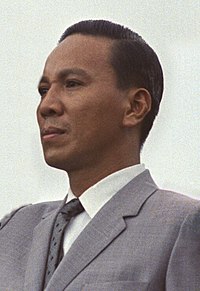Hoàng Viện Trai
Hoàng Viện Trai | |
|---|---|
| 皇院𤳇 | |
 Trai in 1968 | |
| State Director of Nainan | |
| In office 6 February 1956 – 20 December 1972 | |
| Preceded by | Position Established |
| Succeeded by | Nghiêm Nài Phúc |
| General Secretary of the Nainan People's Solidarity and Longevity | |
| In office 17 February 1955 – 20 December 1972 | |
| Preceded by | Position Established |
| Succeeded by | Nghiêm Nài Phúc |
| Personal details | |
| Born | 17 July 1916 |
| Died | 20 December 1972 (Age 56) |
| Cause of death | Gunshot wound |
| Political party | Nainan People's Solidarity and Longevity |
| Spouse | Diệp Nhã Cam |
| Children | 2 Hoàng Lan Trúc Hoàng Lan Mai |
| Alma mater | Royal University of Canhdong |
| Military service | |
| Allegiance | |
| Years of service | 1946-1953 |
| Rank | Lieutenant |
- This is a Nainese name; the family name is Hoàng (皇).
Hoàng Viện Trai (Nainese: 皇院𤳇; 17 July 1916 - 20 December 1972) was a Nainese statesman, revolutionary, politician, and military officer who was the founder and first State Director of the Harmonious Republic of Nainan, serving from the foundation in 1956, throughout the Nainese Civil War, and until his assassination in 1972. He also was the founder of the Nainan People's Solidarity and Longevity, the sole ruling party of Nainan since 1964, as well as the founder of it's central ideology, Tự Ý Chí.
Trai was born on the 17th of July, 1916, in Bao Xuyên, a farming town today located in the Ảnh Lửa Province. During the Great War his family lost much of their wealth. He would attend the local school in Bao Xuyên, where he met his future wife Diệp Nhã Cam. In the late 30s he would attend the Royal University of Canhdong, here he would study political science. He would later join the Nainese Commissariat Armed Forces, where he would reach the rank of officer.
After he left the military he became a professor at the Royal University of Canhdong, where he began to formulate his ideology, Tự Ý Chí. He became very criticizing of the government and wanted revolution, his writings began very popular amongst nationalist revolutionaries. He would eventually form his own political party, the Nainan People's Solidarity and Longevity, which quickly grew in popularity as the monarchy's stability fell. He would gain lots of military support in particular.
After a failed attempt to rid the military of revolutionaries, Trai and his military allies declared revolution and eventually toppled the monarchy. At this time the Nainan People's Republic also rebelled, and Trai's nationalist forces would face the socialists during the Nainese Civil War, his forces would eventually win. He would create the Nainese Constitution in 1965 and banned all other parties except the NPSL. He would solidify his party's control as the State Director and enact policies to rid Nainan of "foreign influence". He would also rid Nainan of socialist elements and began espionage against neighboring socialist states. Trai would become close allies with Shangea and Zorasan due to their similar political ideologies, as National Principlism, and Sattarism were considered the two main inspirations for Tự Ý Chí.
Trai would lead an authoritarian rule but also saw economic growth and strength in Nainan. He would eventually be assassinated in December 1972, when visiting a military camp in the western reaches of Nainan. He was succeeded by his Premier and right hand man Nghiêm Nài Phúc.
Early life
Military Career
During the Kingdom of Nainan
Leader of NPSL
Early Party Growth
Dual Revolution of 1956
Nainese Civil War
State Directorship
1965 Constitution
Social Policy
Economic Policy
Foreign Relations
The Settling
Death
Legacy
Personal Life

In 1946 Trai married Diệp Nhã Cam, a daughter of a wealthy farm owner, she was his partner since they were in school together.
He and Cam had two children, his son Hoàng Lan Trúc in 1954 and daughter Hoàng Lan Mai in 1956. Both of them would become prominant political figures in Nainan, Mai being the current General Secretary of the Nainan People's Solidarity and Longevity.

